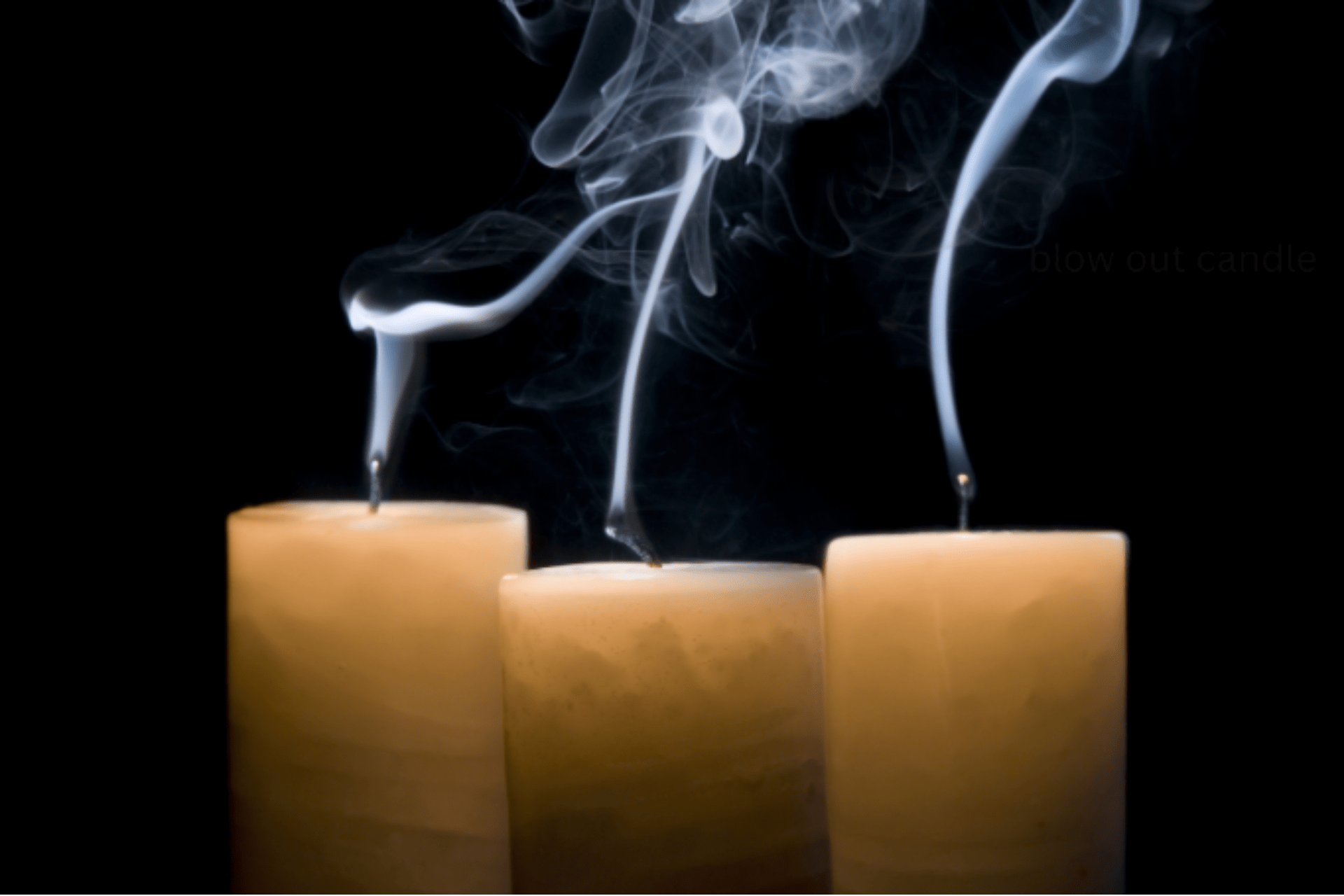This article was updated on September 4, 2024.
Candles haven't always been a charming home decor must-have. In fact, candles are at the center of a slew of different superstitious beliefs ranging from the superficial and funny to the dark and sinister.
Candles can be traced back in history for centuries, but many people don't realize that many cultures used candles for much more ominous purposes than just to cast a bit of reading light.
Intrigued?
You will be soon!
Blowing Out Candles On Birthday Cakes
We'll start with something a bit lighter, just to get our feet wet. The birthday tradition of candles stuck in a cake at a birthday party can be traced back to Ancient Greece as an offering to general deities and goddess Artemis.
Flash forward to Germany circa 1746, where Count Ludwig von Zinzendorf (now there's a mouthful) threw himself a birthday bash for the ages, topping his lavish cake with several candles corresponding to his age.
Quite the trendsetter, that man, because this quickly became the norm for all birthdays in Germany from there on out.
Somewhere along the line, superstition around the act of blowing out candles on birthday cake began to form, with people from a slew of different cultures fervently believing that one would be granted a wish if they could blow the candles out in one fell swoop.
Who doesn't love a bit of magic at their birthday celebration, right?
Fair Warning: A 2017 study from the Journal of Food Research reported that when the birthday boy or girl blows out the birthday candles on a cake, it increases the amount of bacteria on the icing by 1400%.
And when it comes to trick candles? We can't even imagine. What did you get for your birthday this year? The plague.
Religious Practices and Candles
Candles being lit in churches dates way back, past the 18th century, all the way to the Old Testament. Most denominations still use candles in their practices to this day.
Lighting votive candles within the church indicates the offering of a prayer or as a symbol for Christ, known in the Christian bible as the "Light of the World" or "Light of Life." See, that wasn't so scary, right?
Well, here's another church-candle doozy of a tidbit for you. In Belgium, it is believed that if an altar candle burns out for no discernible reason, it's a sign that the minister will soon die.
Now, if another single candle somewhere else in the church burns out, someone in the congregation is doomed to die.
How Earlier Centuries Viewed Candle Luck
Countless superstitions worldwide warn of the bad luck that will come if you light a candle and then forget about it.
Other than it could potentially cause a giant fire, which is an obvious reason to use a candle snuffer before you leave the house, lore tells us that a candle that accidentally burns all the way down will bring ill fortune to the one who lit it.
It makes sense since a dark home might be easier for intruders to sneak in unnoticed.
Have you been searching for ways to keep your farmyard birds safe? (who isn't) If so, this superstition is for you.
Long ago, English farmers would carefully wave a lit candle around their hatching chicken eggs, believing this was a way to bless their chicks and protect them from being snatched by hungry hawks.
Not being farmers in the days of yore, we can neither confirm nor deny if this works. Worth a shot, though, right?
Boring day? Are you itching for someone to spill some tea? Light a candle and watch the flame. An old wive's tale suggests that if the flame suddenly jumps and flickers, a neighbor has gossip to share.
(Oohh, goody!)
History of Candle Superstitions Across Cultures
Candles have been casting both light and mystery for thousands of years across the globe.
Ancient Egyptians used oil lamps and candles in religious rituals, believing the flickering candle flames helped guide spirits to the afterlife.
The Romans are credited with developing the first portable candles, using tallow and beeswax not only to illuminate their homes but also to ward off evil spiritual energy and bad luck.
The Celts believed that lighting candles during Samhain (the festival that inspired Halloween) helped protect against wandering spirits.
Candles represent a link between the living and the divine, a way to seek protection, guidance, or connection to the other side. Whether to summon good fortune or keep malevolent forces at bay, candles have always carried superstitions and ancient beliefs.
Candles in Love and Romance
Love has always been a subject of intrigue, and candles have played a significant role in romantic rituals and superstitions.
In many cultures, lighting a candle during a romantic dinner is believed to ignite passion and deepen the bond between two people.
There's also the age-old practice of lighting two candles from a single flame, symbolizing two souls coming together as one.
In some ancient beliefs, if a couple lights a candle together and it burns without flickering, it's a sign that their love is strong and will endure.
Conversely, a candle that goes out prematurely might be taken as a sign of external forces working against the relationship.
Test your relationship with these romantic candle scents: Smitten, Rosewater, and Moroccan Rose.
Candles in Mourning and Remembrance
Candles have also been a symbol of remembrance for those who have passed away.
In many cultures, it's customary to light a candle on the anniversary of a loved one's death, symbolizing the eternal nature of their spirit and the light they brought into the world.
This practice is not just limited to personal remembrances; many global events, like the Holocaust Remembrance Day, involve lighting candles in memory of the departed.
There's also a belief that if a candle is lit for someone and it burns brighter or longer than expected, it's a sign that the spirit of the departed is near and watching over their loved ones.
Candles in Spirituality and Meditation
In today’s wellness-focused world, candles have taken on a new role in spirituality and meditation. Yoga studios and quiet meditation corners at home are littered with candles that help in grounding practices.
Lighting a candle before meditating is said to symbolize the beginning of an inward journey, helping to clear the mind and set intentions.
Many spiritual practitioners even use specific candles for manifesting their desires, with colors and scents chosen for their energy-boosting properties. White candles for clarity, green candles for abundance, or lavender candles for calm.
Ground yourself during your next meditation with these relaxing scents: Lavender, Eucalyptus, Sage, Chamomile, and Spearmint.
Candles in Divination and Fortune Telling
Beyond the realm of the living and the dead, candles have also been used as tools for divination. The art of Ceromancy, or candle wax reading, involves interpreting the shapes and patterns of melted candle wax.
As the wax melts and forms patterns, a skilled reader can interpret these shapes to predict future events or gain insights into one's life.
Another method involves studying the flame of the candle. A steady flame might indicate a positive outcome, while a wavering or dancing flame could suggest uncertainty or external influences at play.
Candles in Pop Culture
When things get spooky you can bet a candle is involved. From witchy classics like "The Craft" to séances in just about every horror movie ever made, candles are practically Hollywood’s go-to prop for communicating with the spirit world.
Who could forget the dramatic candlelit corridors in The Haunting of Hill House, or the flickering flames in Hocus Pocus that signaled some form of magic and all kinds of supernatural mischief was afoot?
Candles in pop culture are often used to set a mystical, eerie mood, or as symbols of mystery and magic—whether in a darkened room or on a villain’s altar.
Modern-Day Candle Superstitions
Candle superstitions persist, though they may look a little different now. We still put candles on a cake and sing Happy Birthday in the hopes our wishes will come true.
Many still believe that a flickering candle during a dinner party signals that someone is talking about you.
And of course, there's the trend of using candles for aromatherapy, spiritual healing, and energy cleansing. A lavender-scented candle during meditation symbolizes inner peace and spiritual alignment.
Even though we may not rely on candlelight to guide us home anymore, the superstitions around candles certainly haven't burned out.
Halloween Candles
And finally, we will end on a creepy note to celebrate the spooky season. Séances used to interact with the "other side" would often light a series of candles, asking any spirits present to use the flames to pass along messages.
If these candles were to blow out suddenly, it was thought that an evil spirit was not only present but looking to harm those participating in the ceremony. (Yeah, no thanks).
Yes, we realize that many of these superstitions are probably just that— silly, unfounded fears— but that doesn't make knowing the history of our favorite home decor item any less interesting, right?
Shop Our Perfect For Fall Spooky Candle Collection
Head over to our perfect fall candles scent collection and start stocking up, or check out some of our accessories, like our Wick Dippers.
Better safe than cursed for all eternity, right?








